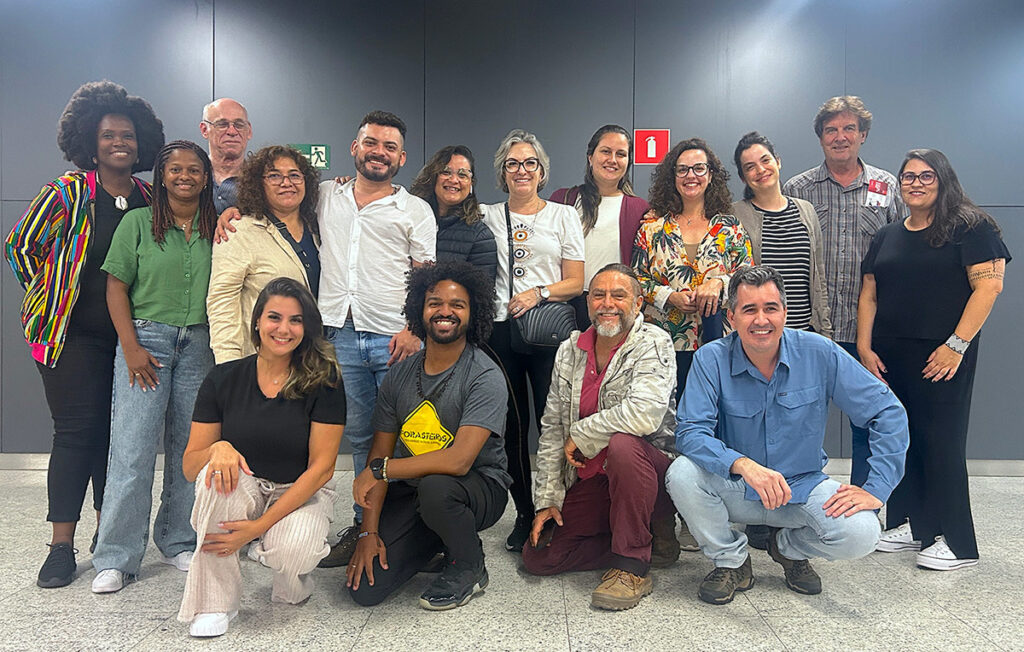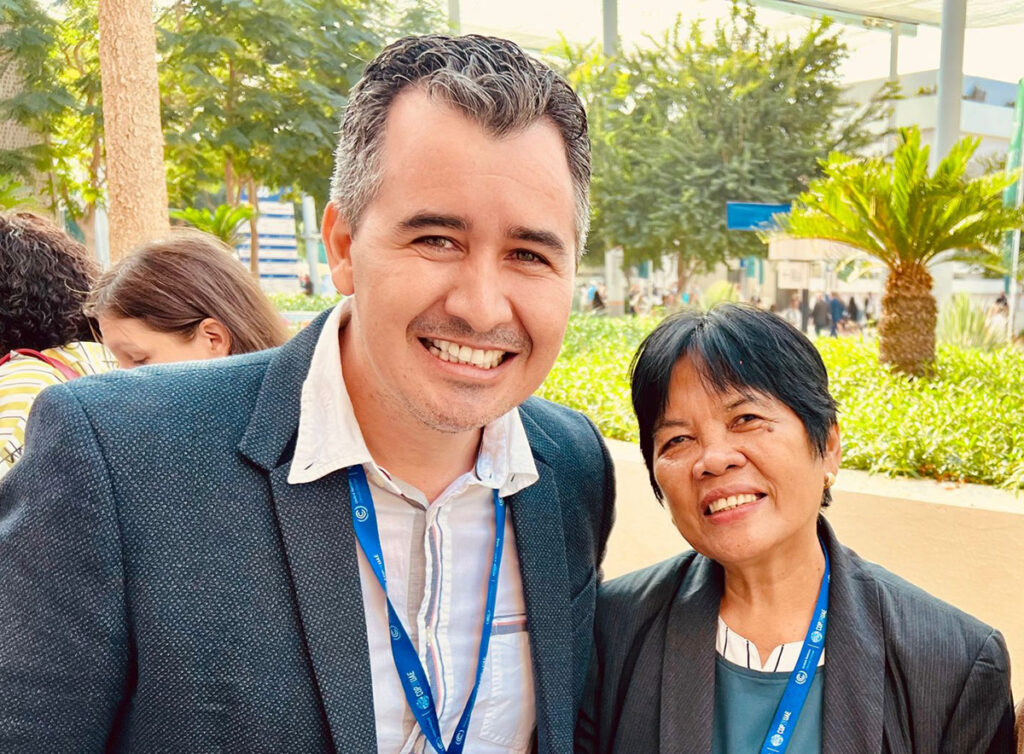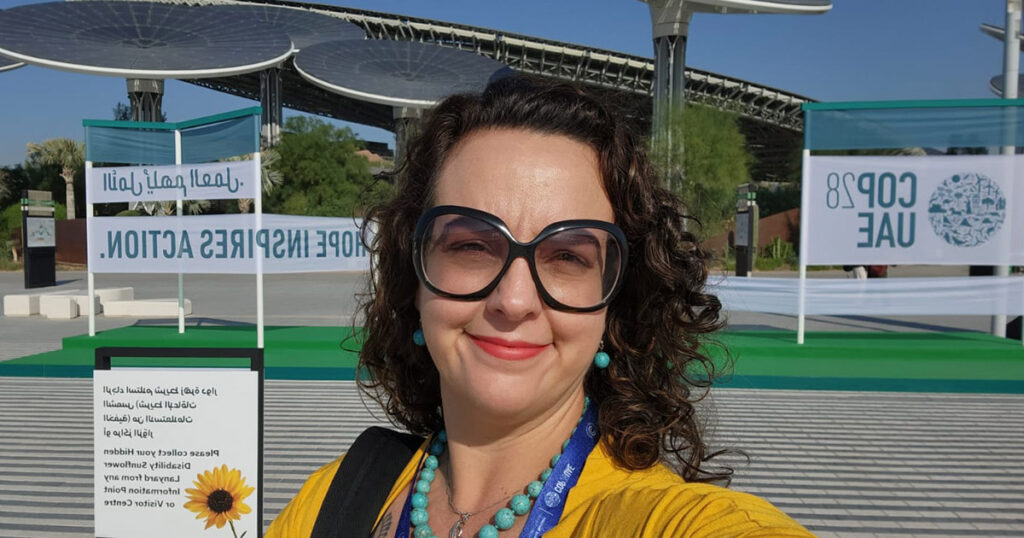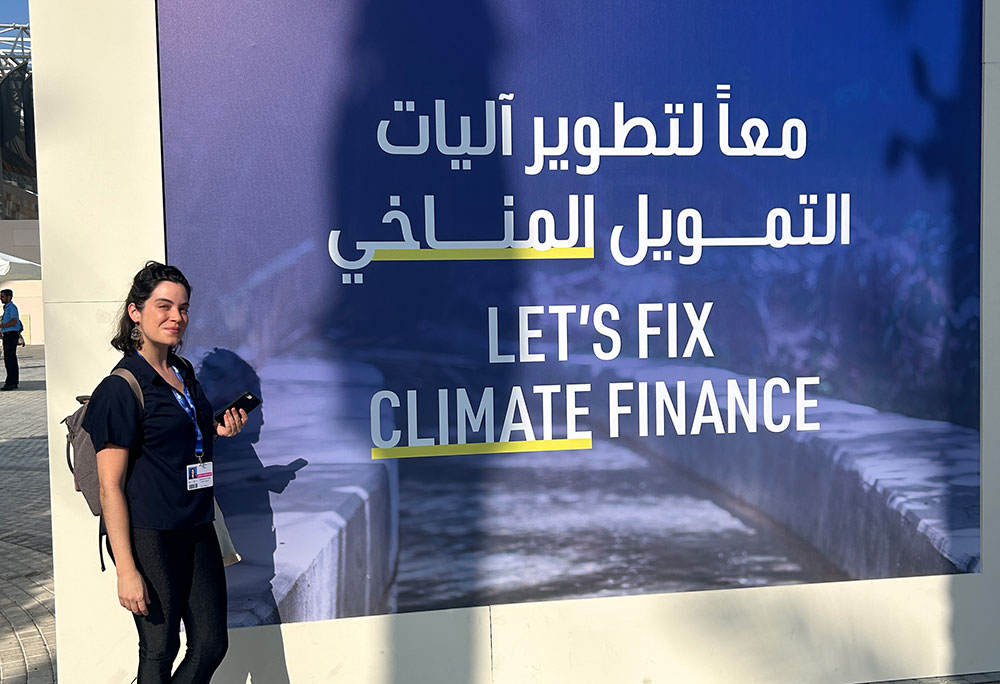Read about our events and reflections

Alianza Delegation at COP28
Alianza was present at COP 28, the 2023 edition of the United Nations Conference on Climate Change, held between November 30 and December 12, 2023, in Dubai, United Arab Emirates. Represented by Executive Coordinator Juliana Tinoco, Eduardo Franco, Director of the Semilla Socio-Environmental Foundation, Vanessa Purper, and an extensive delegation from Casa Fund, including members of the fund and representatives of projects supported by the organization.
Both Eduardo and Vanessa shared their impressions and opinions in two brief exclusive interviews for Alianza.
Eduardo Franco, director of the Semilla Socio-environmental Foundation

Hello, Eduardo, first of all, what is the Semilla Socio-environmental Foundation?
The Fundación Socioambiental Semilla is a socio-environmental fund, a member of the Socio-environmental Funds of the Global South, and we have been working in Bolivia since 2019. So far, we have supported over 100 groups, providing just over half a million dollars in grants.
With what focus?
The focus is socio-environmental themes and has a lot to do with conserving different ecosystems. For Bolivia, the main issue is the loss of ecosystems: it ranks as the third country in the world in terms of deforestation. Thus, we are trying to assist communities in conserving forests and ecosystems, which are both the livelihoods and sustainable development of these communities. We also have a focus on gender, women’s rights, environmental journalism, and, of course, climate change.
And here, at the COP, what did you come to follow? What were your main impressions of what you followed regarding climate finance?
I’ve been participating in two different spaces. In one of them, there was a bit more focus on bilateral cooperation between countries, such as the Ministry of Canada, representing the Global Environmental Facility of Canada, and in the other, I heard about types of climate financing through large structures, such as the Green Climate Fund and the GEF (Global Environmental Facility), which are two of the largest and most recognized, and are currently trying to exchange information to better coordinate their actions.
My perception after participating in some spaces is that they continue to be very bureaucratic funds, very centralized in government structures, and accessing resources is very slow for the climate urgency that exists. However, these other types of climate financing, such as Canada’s and cooperation from other countries like the UK and Norway, for example, could be somewhat faster for local funds to have access. So, I think these are ways to continue exploring climate financing together.
I also supported civil society spaces, the work of groups, and movements. It’s very important to connect with new groups that are defending the territory, indigenous resistance, and get to know many of these groups that some I didn’t know. It’s essential for the mapping that funds constantly have to do, to see how to bring resources on the ground.
Vanessa Purper, Program Manager of Casa Fund

Tell us about the work that Fundo Casa did in organising a delegation. How large was this delegation? What profile did it have? And, in general terms, what does it involve organising such a delegation?
It’s a lot of work. It involves months and months of conversations and coordination, mobilising resources and presence. Besides organising the technical and logistical aspects, we also organised a part of qualification and opportunities to deepen the knowledge necessary to take advantage of such participation. Fundo Casa also conducted a lot of fundraising with various funders, as Dubai is an expensive destination, considering airfare, accommodation, travel insurance, and meals.
We conducted a learning journey that promoted seven meetings, inviting people with high knowledge in specific and important topics for COP, such as carbon markets, loss and damage, adaptation programs, funds, the negotiation universe, and how each constituency operates. It is important for civil society to be alert and informed about what and how things are being done.
The agreements and meetings that take place throughout the year before COP happens: what are they? Why do they happen? When we follow an official negotiation, what chapter should we be familiar with to understand what is happening? When a country opposes, when it votes together, when something passes, how will it impact life and territory? Will it open up for more mining? Will it explore oil in the mouth of the Amazon? And so on. It’s a vast universe, and that’s why it’s very important for us to have time, energy, and care to work on this delegation.
This year, Fundo Casa brought 17 people, including the team, which is in a smaller number, and environmental defenders who are part of our universe: Black women, quilombolas, indigenous people, extractivists, those at the forefront of defending human and environmental rights in various biomes in our country, related to various support programs within Fundo Casa.
Youth is also a topic we are paying close attention to, working to ensure that there is increasingly more space for active youth in the climate field to be present, informed, and well-supported to fulfill this role of hope.
Gender-just climate policy and finance - Alianza participates in a COP28 panel on fair financing
The panel “Gender-just climate policy and finance: from barriers to actionable solutions” was held at COP 28 with the aim of showcasing “barriers as well as solutions to bilateral and multilateral climate financing models,” promoting gender-focused grassroots climate actions. Juliana Tinoco, the executive coordinator of Alianza Socioambiental Fondos del Sur, was present at the panel.
Juliana began her intervention by highlighting the intricate web of factors contributing to the climate crisis, emphasizing historical injustices, colonial development, and the exploitative nature of capitalism as primary culprits. Furthermore, she underscored the importance of adopting a systemic perspective in the pursuit of Climate Justice, focusing on historical systems of oppression as key elements for the crisis.
Drawing attention to an especially severe aspect of the current environmental crisis, Juliana reminded that those most affected by the climate crisis often possess the fewest resources for adaptation: yet, these communities, intimately familiar with the issue, also hold the best solutions. Transformative innovations born from their experiences and ancestral knowledge, although still underfunded and undervalued, are proving effective at local, regional, and global scales.
The executive coordinator thus stressed the significance of recognizing and supporting these impacted communities, affirming them as the best-positioned actors to articulate the crisis’s impact and generate essential solutions. In the same vein, she criticized the inadequate allocation of global philanthropic funding for climate change, especially the minimal support for justice and equity efforts.

Additionally, her intervention highlighted essential flaws in the functioning of philanthropic support in general, often fixed on technical solutions and standard operational practices, limiting access to funding for smaller community-based organizations. Juliana noted the immense potential of local strategies to catalyze global changes, fundamentally requiring collaboration, learning, and investment.
Her participation also represented the work of Alianza and its 13 member funds in financing underfunded communities in Asia, Africa, and Latin America, fostering collaboration and strategic communication within the financing ecosystem with community-based initiatives. Lastly, Juliana extended an invitation for everyone to learn about and engage with the Alliance, highlighting the value of the opportunity for knowledge exchange and co-creation of innovative financial approaches to address the climate justice agenda and drive this collective effort.
The panel also featured Zonia Zacarias from the Council of Indigenous Women and Biodiversity, Andrew Hurst, Executive Director of Climate Financing at Global Affairs Canada, René van Hell, Director Inclusive Green Growth at the Dutch Ministry of Foreign Affairs, Maria Matui, Executive Director for Women Action Towards Economic Development (WATED), Tiffany Hodgson, Head of Gender and Social Safeguard Division at the Green Climate Fund, Amy Clemitshaw, Senior Official at Foreign, Commonwealth, and Development Office of the UK government, Amanda Costa from Perifa Sustentável and Vozes Negras pelo Clima organizations, Nida Collado, president of the Macatumbalen Community Based Forest and Management Association (MCBFCMA) – the last two linked to projects supported by Alianza funds (Casa Fund and the Pastor Rice Fund).

